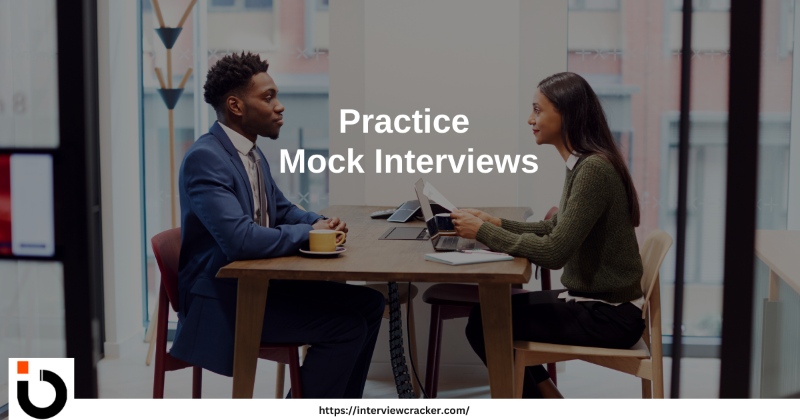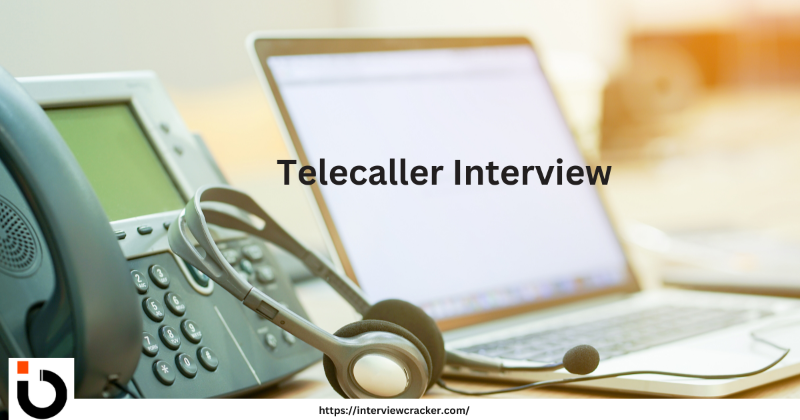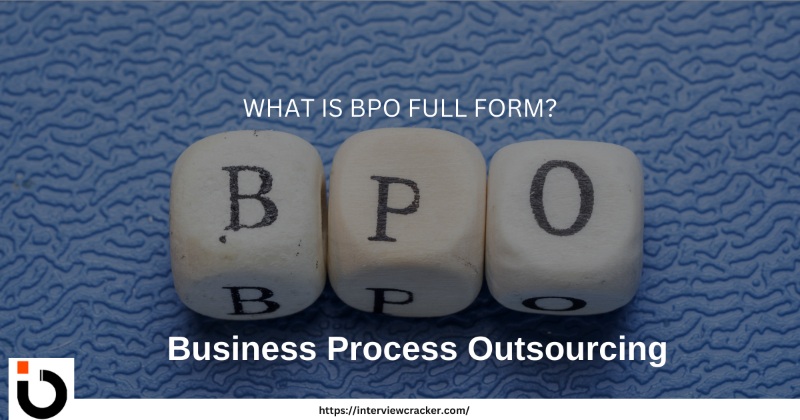Landing a job as a Telecaller, Telesales, or Telemarketing Executive requires more than just good communication skills—it demands confidence, persuasion, and the ability to handle objections effectively.
If you’re preparing for an interview in this field, you need to be ready for questions that test your sales acumen, customer-handling skills, and problem-solving abilities. In this blog, we’ll cover the most common interview questions along with proven answers to help you stand out and secure the job with ease!
Table of Contents
ToggleWhat is Telemarketing Executive?
A telemarketing executive is a professional who engages in outbound and inbound telephone calls to promote products or services, generate sales leads, or conduct market research. Their primary responsibility is to communicate with potential customers over the phone to drive sales and achieve marketing objectives.
What is the Role of a Telecaller, And Why is a Successful Interview Important?
A telecaller, also known as a telemarketer or call center representative, plays a crucial role in a company’s communication with its customers. They are responsible for making outbound calls to potential clients, following up with leads, and providing support to existing customers. In essence, telecallers are often the first point of contact between a company and its clients.
A successful telecaller interview is vital for several reasons. First, it determines if you have the skills and qualities necessary for the role. Companies seek candidates who can effectively communicate, persuade, and handle various customer interactions. Second, the telecaller position is integral to a company’s growth and customer relationship management. A poor hiring decision can have a negative impact on the business. Therefore, interview success is not just about securing a job but also contributing to the company’s success.

How Should I Prepare for a Telecaller Interview?
Proper preparation is the key to a successful telecaller interview. Here are some essential steps to get you ready:
Research the Company: Start by researching the company you’re interviewing with. Understand its products, services, mission, and values. This knowledge will demonstrate your interest and enthusiasm during the interview.
Review Your Resume: Your resume will likely be a focal point of discussion. Make sure you are well-versed in the details you’ve provided. Be prepared to elaborate on your work experience, skills, and achievements.
Dress Code and Professional Appearance: Dress professionally, adhering to the company’s dress code if mentioned. Dressing appropriately not only reflects your seriousness about the job but also sets a positive impression.
Punctuality and Interview Etiquette: Arrive for the interview on time, or if it’s a virtual interview, be ready a few minutes in advance. During the interview, maintain proper etiquette by listening carefully, answering questions thoughtfully, and asking questions when appropriate.
What are Some Common Telecaller Interview Questions?
Telecaller interviews often include questions that assess your communication skills, adaptability, and customer service abilities. Here are some common questions you might encounter:
Common Interview Questions for Telemarketer
“Tell me about yourself.”
This open-ended question allows you to introduce yourself and highlight your relevant skills and experience.
Example: “I’m an enthusiastic and dedicated professional with a background in customer service and communication. I recently completed my degree in Communication and during my studies, I developed strong interpersonal skills and learned the importance of effective communication. I’ve always been passionate about working directly with people and helping them with their needs. I believe a telecaller role is a great opportunity for me to apply my skills and make a meaningful impact by connecting with customers on a personal level.”
“Why do you want to work as a telecaller?”
Be prepared to explain your motivation and how the role aligns with your career goals.
Example: “I’m genuinely excited about the prospect of working as a telecaller because it offers a unique chance to refine my communication abilities and build a deep understanding of customer needs. This role allows me to interact with diverse individuals daily, which I find extremely rewarding. I believe that by working closely with customers, I can play a vital role in addressing their concerns and promoting our products or services effectively.”
“What do you know about our company?”
Showcase your research by discussing the company’s history, products, services, and values.
Example: “I’ve done some research on your company, and I’m impressed by your commitment to delivering exceptional products/services and maintaining a strong customer-centric approach. Your company has a reputation for its innovation and dedication to meeting customer needs. I’m excited about the possibility of contributing to a company that values customer satisfaction as a top priority.”
“How do you handle rejection?”
Demonstrate your resilience and ability to learn from setbacks.
Example: “I view rejection as an opportunity for growth rather than a setback. It’s important to remember that in a role like this, not every call will result in a positive outcome. I see rejection as a chance to learn, improve, and refine my approach. I’m resilient and persistent, and I believe that each ‘no’ brings me one step closer to a ‘yes.'”
“How do you prioritize your calls and leads?”
Explain your approach to managing and organizing your call list.
Example: “I prioritize calls and leads based on several factors, including the lead’s level of interest, the potential for conversion, and the value it could bring to the company. I believe in being efficient and organized in my approach. For instance, I’ll give high-priority to leads showing immediate interest and those that align with our target customer profile.”
“Can you work in a target-driven environment?”
Describe your experience with targets and your strategies for meeting them.
Example: “Yes, I’m comfortable working in a target-driven environment. In fact, I thrive in such an environment. I see targets as motivating goals that drive me to perform at my best. I’m committed to meeting and exceeding targets to contribute to the company’s success.”
“How do you handle irate or difficult customers?”
Emphasize your customer service skills and conflict resolution abilities.
Example: “When dealing with irate or difficult customers, I remain calm and empathetic. I actively listen to their concerns and show understanding. I aim to find solutions and resolve issues in a professional and courteous manner. My goal is to de-escalate the situation and ensure that the customer leaves the interaction with a positive impression of our company.”
“What is your approach to cold calling?”
Discuss your techniques for making successful cold calls.
Example: “My approach to cold calling is methodical and well-researched. I believe in starting with a strong understanding of the potential client’s needs and interests. This allows me to tailor my pitch to their specific requirements. I also emphasize the importance of introducing myself and our company in a clear and concise manner to capture their attention from the start.”
“How do you keep yourself motivated in this role?”
Share your self-motivation strategies and commitment to achieving targets.
Example: “I stay motivated by setting personal goals and recognizing my achievements along the way. I also find motivation in the positive feedback from satisfied customers. Additionally, I continuously educate myself about our products and services, which enhances my confidence and enthusiasm. I believe that maintaining a positive attitude and focusing on personal and team success is key to staying motivated in this role.”
“What do you consider the most challenging aspect of this job?”
Highlight your awareness of potential challenges and your problem-solving abilities.
Example: “The most challenging aspect of this job, in my opinion, is maintaining a consistently high level of performance while dealing with varying customer responses. Every customer interaction is unique, and sometimes it can be challenging to adapt and maintain enthusiasm, especially when facing rejection or difficult customers. However, I see these challenges as opportunities for personal growth and learning, and I’m committed to overcoming them to excel in this role.”

List of Recommended Books For Interview Preparation
Here are some books to enhance your interview preparation:
“Knock ’em Dead:
The Ultimate Job Search Guide” is a comprehensive guide to the job search process, covering everything from how to write a resume and cover letter to how to ace an interview. It is written in a clear and concise style, and it is packed with practical tips and advice.
“How to Win Friends and Influence People”
This is a classic book on interpersonal skills. It provides advice on how to build relationships with others, how to communicate effectively, and how to persuade others to see your point of view. It is written in a more engaging and storytelling style, and it is full of anecdotes and examples from Carnegie’s own life.
“Telephone Sales: How to Prospect, Qualify, Present, Close, and Follow Up” by Stephen Schiffman
This book provides a comprehensive overview of the telemarketing process, from prospecting to follow-up. It includes tips on how to build rapport with customers, overcome objections, and close deals.
“Mastering Telemarketing: Proven Strategies for Boosting Sales and Profits” by Ivan Misner and Mark Hunter
This book provides a variety of strategies for improving your telemarketing skills. It covers topics such as how to generate leads, qualify prospects, and deliver effective sales presentations. It also includes tips on how to handle difficult customers and close deals.
“The Telemarketing Handbook: A Complete Guide to the Secrets of Successful Telemarketing” by Adrian Miller
This book covers all aspects of telemarketing, from planning to marketing to managing your time. It also includes tips on how to overcome the challenges of telemarketing and build a successful career.
“Nail the Interview, Rock the Job: How to Ace Any Interview and Get the Job You Love” by Tina Fey
This book is written by actress and comedian Tina Fey, and it shares her insights on how to ace job interviews. Fey provides practical advice on everything from how to dress for the interview to how to handle difficult questions. She also shares stories from her own career path to inspire and motivate readers.
“The STAR Method: Prepare for Any Interview with 7 Simple Steps by Penelope Trunk”
This book teaches you how to use the STAR method to answer behavioral interview questions. The STAR method is a framework for answering questions about your past experiences and accomplishments in a way that is clear, concise, and persuasive.
“The Perfect Interview: How to Land Your Dream Job Every Time” by Max Eggert
This book provides a comprehensive guide to the job interview process, covering everything from how to prepare for common interview questions to how to negotiate a job offer. It also includes expert advice on body language, communication skills, and how to make a lasting impression on employers.
FAQs on Telecaller Interview Questions
How should I respond to industry-specific telecaller job interview questions?
Tailoring your answers to the industry is vital for showcasing your relevance and adaptability. Here are some tips for answering industry-specific questions effectively:
Research the Industry: Gain a deep understanding of the industry the company operates in. For example, if you’re interviewing for a financial services company, familiarize yourself with key financial products and services.
Demonstrate Product Knowledge: When asked about the company’s products or services, provide detailed information. Show how you can effectively communicate their value to potential customers.
Adaptability: Highlight your flexibility and adaptability, especially when the industry is known for frequent changes or market fluctuations.
Structured Responses: Ensure your answers are well-structured and organized, making it easy for the interviewer to follow your thought process.
How can I answer challenging telecaller interview questions effectively?
Challenging questions often require thoughtful responses. Here’s a guide on how to tackle them:
Analyze the Situation: Take a moment to analyze the question and consider your response. If necessary, ask for clarification.
Detailed Responses: Provide detailed answers that include real-life examples or scenarios. For instance, when asked how you handle irate customers, share a specific situation where you successfully resolved a difficult customer issue.
Problem-Solving and Interpersonal Skills: Emphasize your problem-solving abilities and your capacity to handle interpersonal challenges. These skills are crucial in the telecaller role.
Why is English proficiency important for telecallers, and do you have any tips for non-native speakers?
English proficiency is crucial for telecallers because effective communication is at the core of the role. To enhance your English skills as a non-native speaker, consider the following tips:
Reading: Read books, articles, and news in English to improve your vocabulary and comprehension.
Speaking Practice: Engage in conversations with native speakers or fellow English learners. This will boost your conversational skills.
Language Learning Resources: Explore language learning apps, online courses, and language exchange programs to facilitate your English language journey.
What’s the key takeaway for acing a telecaller interview?
The most critical takeaway is that success in a telecaller interview relies on thorough preparation and effective communication. Practice your responses, highlight your relevant skills and experiences, and approach the interview with confidence. With the right approach, securing a telecaller job is a realistic goal.




